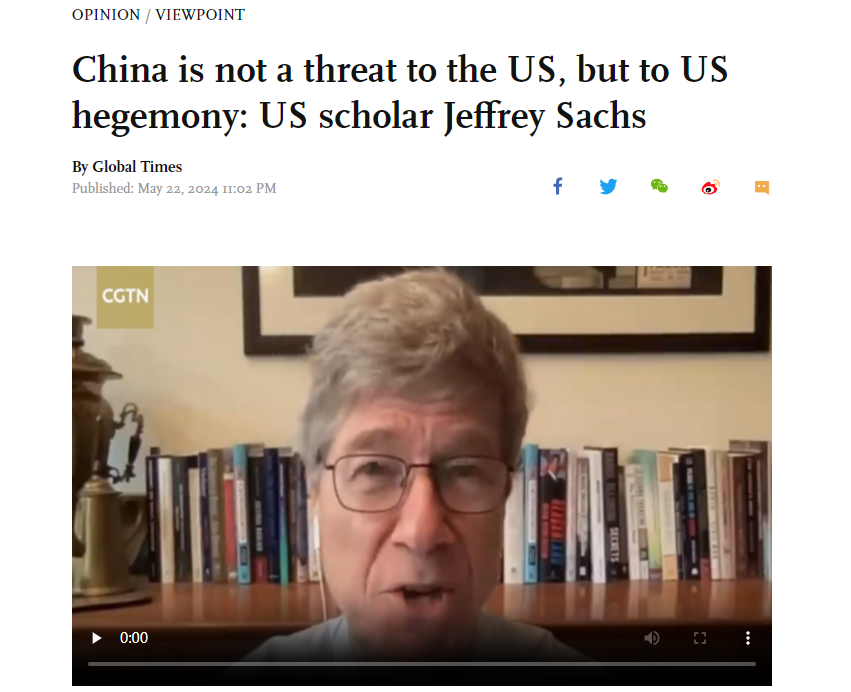LATEST INSIGHTS
Your Present Location: LATEST INSIGHTSJeffrey Sachs: China is not a threat to the US, but to US hegemony: US scholar Jeffrey Sachs
Source: GT Published: 2024-05-22

China is not a threat to the US itself, but rather a threat to US hegemony, US scholar Jeffrey Sachs said in a recent interview with Chinese media. He described the US' reaction to China's rise as 'neurotic,' pointing to publications like Foreign Affairs magazine which constantly discuss how to maintain US superiority over China and spread paranoia about China.
'Basically, what's happening is that China poses a threat to US hegemony. It's not a threat to taking over the US, to you, or to me, but a threat to the claim that the US runs the world,' Sachs pointed out.
Sachs emphasized that China is not trying to take over the US and the reason why China is deemed as a threat by the US is because China is showing that it does not run the world the way the US likes to think it does.
In the US nowadays, various versions of 'China threat' theories are rampant, revealing a neurotic sense of anxiety about China-related issues among US media and elites. From weather balloons to Chinese corn factories, garlic and cranes, and the recent hype about the so-called overcapacity brought by Chinese electric vehicles, US elites seem fixated on anything that could be perceived as a 'China threat' and use this to justify their crackdown on China. This only reveals their anxiety about China's rise and their fear of losing hegemony, analysts believe.
Other foreign scholars have also expressed views similar to those of Sachs. 'We should not underestimate just how important being No.1 is to America's sense of identity,' wrote British scholar Martin Jacques in a column for the Global Times. Jacques argued that for sustaining US hegemony, rather than seeing China as a relatively benign partner, the US instead regards China as a threat to its global primacy and find ways to contain, weaken and undermine it.
'No one country should consider itself leader of the whole world, because we need a world that is diverse, multipolar, and governed not by decisions of one country or the primacy of one country but by international law, especially the UN Charter,' said Sachs in a previous interview with the Global Times, urging the US to develop a cooperative relationship with China.
'Right now, we are on a dangerous course. American foreign policy toward China is misguided and a serious mistake,' he warned, noting that US politicians have been on a campaign to discredit China and to build an alliance of nations against China, which is obviously a very misguided and dangerous idea.
Joseph Solis-Mullen, a political scientist and economist at the Libertarian Institute, also told the Global Times that the US must learn how to live with and deal with large, powerful states that do not acquiesce to US security prerogatives. 'It is up to Americans to start demanding new and better ones, ones geared toward cooperation and the prosperity of all, not attempted global hegemony,' he added.
Stephen Roach, a faculty member at Yale University and former chairman of Morgan Stanley Asia, refuted the increasingly rampant 'Sinophobia' in the US in an article in the South China Morning Post on March 28. In the article, Roach said, 'There is good reason to worry about an increasingly virulent strain of this phobia spinning out of control in the US.'























































































 京公网安备 11010802037854号
京公网安备 11010802037854号





